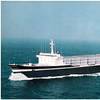Republicans on the House Homeland Security Economic Security Subcommittee on March 30 rejected a proposal from Democrats that would have required all cargo containers headed for the United States to have tamper-resistant seals and be scanned for illicit materials. The proposal, offered as an amendment to the Security and Accountability for Every Port bill, was defeated on an 8-6 party-line vote before the subcommittee passed the bill by unanimous voice vote. The defeated amendment would have required the Homeland Security Department to issue new regulations within three years requiring all containers to have hardened seals and be scanned before leaving a foreign port. Homeland Security Economic Security Subcommittee Chairman Dan Lungren, R-Calif., led opposition to the amendment, saying the requirement for scanning all containers is not technically feasible or logical. Despite the partisan split, the panel's Republicans and Democrats approved another proposal that would require Homeland Security to create a program to test and deploy next-generation radiation portal monitors at U.S. seaports that have a high volume of containerized cargo. Concerns over cargo security heightened in Congress after news broke last month that a Dubai-owned company sought to manage terminal operations at major U.S. ports. The SAFE Port bill would provide about $800 million a year to beef up the nation's maritime security programs, and require the Homeland Security Department to establish a strategic plan to quickly resume maritime commerce if there was an attack. A similar measure known as the Greenlane Maritime Cargo Security Act is moving through the Senate. The Senate Homeland Security and Governmental Affairs Committee plan a hearing on that bill next week. (Source: GovExec.com)
Sponsored Content
The Future of the Advanced Measurement Industry: A Vision of Precision, Safety, and Reliability

Subscribe for
Maritime Reporter E-News
Maritime Reporter E-News is the maritime industry's largest circulation and most authoritative ENews Service, delivered to your Email five times per week










